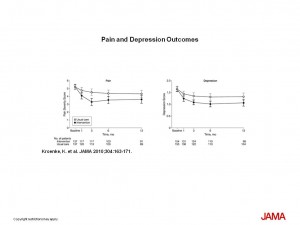 People with cancer can successfully manage their pain and depression through telephone contact with health providers and home monitoring, demonstrated by a clinical trial conducted among 405 patients in Indiana.
People with cancer can successfully manage their pain and depression through telephone contact with health providers and home monitoring, demonstrated by a clinical trial conducted among 405 patients in Indiana.
The randomized trial findings are published in the July 14, 2010, issue of JAMA in, Effect of Telecare Management on Pain and Depression in Patients With Cancer. In the study, the Indiana Cancer Pain and Depression (INCPAD) trial assessed patients with pain, depression, and both depression and pain.
Pain and depression are the most common physical and psychological symptoms in cancer patients, according to an AHRQ Evidence Report/Technology Assessment. These symptoms go largely untreated for people with cancer, which may exacerbate outcomes.
The point of the telecare process is to engage the patient with a collaborative team-based approach, including a care manager and a physician specialist and a complement of other team-players that, together, put the patient at the center of the care process. This approach, coupled with the technology interventions, worked well for the cancer patients who suffered the two most prevalent symptoms beyond the primary diagnosis of cancer.
Health Populi’s Hot Points: “The new ‘wellness delivery channel’ for ubiquitous care will be the smartphone, and it will happen sooner than you think,” Dr. John Mattison, CMIO for Kaiser-Permanente, told the Southern California Health Care Summit in October 2009. By the 4th quarter of 2011, most mobile phones in the U.S. will be smartphones than feature phones. So the platform for Dr. Mattison’s wellness delivery channel will be fairly ubiquitous.
The FCC voted on July 15, 2010, to allocate $400 million to fund health providers in adopting broadband. There’s a thick chapter on health in the FCC’s National Broadband Plan, published earlier this year, which speaks to the importance of broadband as a backbone to modernizing the U.S. health system.
Telehealth is enabled through broadband, which would broaden and enrich the sort of tele-connections the INCPAD study found so beneficial to cancer patients. Connecting the dots of broadband and telehealth will be key, and getting the funds into the hands of rural and other communities who serve health citizens will help the U.S. get this innovative care where it needs to be: in the patients’ homes.




 I'm in amazing company here with other #digitalhealth innovators, thinkers and doers. Thank you to Cristian Cortez Fernandez and Zallud for this recognition; I'm grateful.
I'm in amazing company here with other #digitalhealth innovators, thinkers and doers. Thank you to Cristian Cortez Fernandez and Zallud for this recognition; I'm grateful. Jane was named as a member of the AHIP 2024 Advisory Board, joining some valued colleagues to prepare for the challenges and opportunities facing health plans, systems, and other industry stakeholders.
Jane was named as a member of the AHIP 2024 Advisory Board, joining some valued colleagues to prepare for the challenges and opportunities facing health plans, systems, and other industry stakeholders.  Join Jane at AHIP's annual meeting in Las Vegas: I'll be speaking, moderating a panel, and providing thought leadership on health consumers and bolstering equity, empowerment, and self-care.
Join Jane at AHIP's annual meeting in Las Vegas: I'll be speaking, moderating a panel, and providing thought leadership on health consumers and bolstering equity, empowerment, and self-care.